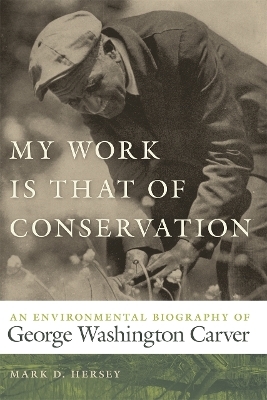
My Work Is That of Conservation
An Environmental Biography of George Washington Carver
Seiten
2011
University of Georgia Press (Verlag)
978-0-8203-3870-5 (ISBN)
University of Georgia Press (Verlag)
978-0-8203-3870-5 (ISBN)
George Washington Carver (ca. 1864-1943) is at once one of the most familiar and misunderstood figures in American history. In My Work Is That of Conservation, Mark D. Hersey reveals the life and work of this fascinating man who is widely - and reductively - known as the African American scientist who developed a wide variety of uses for the peanut.
George Washington Carver (ca. 1864–1943) is at once one of the most familiar and misunderstood figures in American history. In My Work Is That of Conservation, Mark D. Hersey reveals the life and work of this fascinating man who is widely—and reductively—known as the African American scientist who developed a wide variety of uses for the peanut.
Carver had a truly prolific career dedicated to studying the ways in which people ought to interact with the natural world, yet much of his work has been largely forgotten. Hersey rectifies this by tracing the evolution of Carver’s agricultural and environmental thought starting with his childhood in Missouri and Kansas and his education at the Iowa Agricultural College. Carver’s environmental vision came into focus when he moved to the Tuskegee Institute in Macon County, Alabama, where his sensibilities and training collided with the denuded agro systems, deep poverty, and institutional racism of the Black Belt. It was there that Carver realised his most profound agricultural thinking, as his efforts to improve the lot of the area’s poorest farmers forced him to adjust his conception of scientific agriculture.
Hersey shows that in the hands of pioneers like Carver, Progressive Era agronomy was actually considerably “greener” than is often thought today. My Work Is That of Conservation uses Carver’s life story to explore aspects of southern environmental history and to place this important scientist within the early conservation movement.
George Washington Carver (ca. 1864–1943) is at once one of the most familiar and misunderstood figures in American history. In My Work Is That of Conservation, Mark D. Hersey reveals the life and work of this fascinating man who is widely—and reductively—known as the African American scientist who developed a wide variety of uses for the peanut.
Carver had a truly prolific career dedicated to studying the ways in which people ought to interact with the natural world, yet much of his work has been largely forgotten. Hersey rectifies this by tracing the evolution of Carver’s agricultural and environmental thought starting with his childhood in Missouri and Kansas and his education at the Iowa Agricultural College. Carver’s environmental vision came into focus when he moved to the Tuskegee Institute in Macon County, Alabama, where his sensibilities and training collided with the denuded agro systems, deep poverty, and institutional racism of the Black Belt. It was there that Carver realised his most profound agricultural thinking, as his efforts to improve the lot of the area’s poorest farmers forced him to adjust his conception of scientific agriculture.
Hersey shows that in the hands of pioneers like Carver, Progressive Era agronomy was actually considerably “greener” than is often thought today. My Work Is That of Conservation uses Carver’s life story to explore aspects of southern environmental history and to place this important scientist within the early conservation movement.
MARK D. HERSEY is an assistant professor of history at Mississippi State University.
| Erscheint lt. Verlag | 30.5.2011 |
|---|---|
| Zusatzinfo | 12 black & white photographs, 1 map |
| Verlagsort | Georgia |
| Sprache | englisch |
| Gewicht | 333 g |
| Themenwelt | Literatur ► Biografien / Erfahrungsberichte |
| Geschichte ► Teilgebiete der Geschichte ► Technikgeschichte | |
| Naturwissenschaften ► Biologie ► Ökologie / Naturschutz | |
| Sozialwissenschaften ► Soziologie | |
| ISBN-10 | 0-8203-3870-2 / 0820338702 |
| ISBN-13 | 978-0-8203-3870-5 / 9780820338705 |
| Zustand | Neuware |
| Haben Sie eine Frage zum Produkt? |
Mehr entdecken
aus dem Bereich
aus dem Bereich
Buch | Softcover (2024)
Lehmanns Media (Verlag)
CHF 27,90
Vom Perceptron zum Deep Learning
Buch | Softcover (2022)
Springer Vieweg (Verlag)
CHF 27,95
Digitalisierung neu denken für eine gerechte Gesellschaft
Buch | Hardcover (2023)
Quadriga (Verlag)
CHF 27,95


